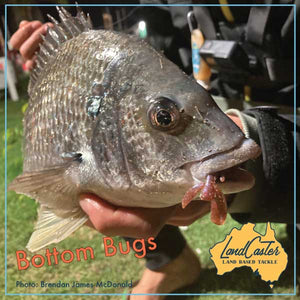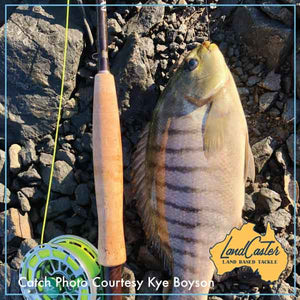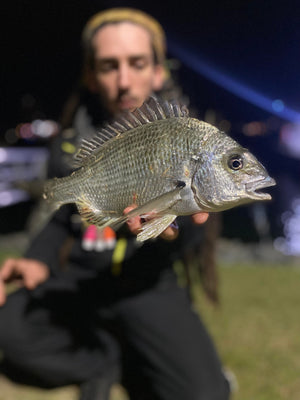
A Food Enthusiast's Guide to Fresh Caught Fish
Eating Quality and Handling: A Food Enthusiast's Guide to Fresh Caught Fish
Impact of handling on the eating quality of fish
Catching fish is an enjoyable pastime for many, but few people realize that how you handle your fish from the moment you catch them will impact their eating quality. Different cultures have evolved different methods of handling fish for different outcomes. The same fish, such as a luderick, can have different tastes and textures depending on how you handle it. You might change how you handle it depending on how you want to use it.
Importance of Cleaning and Gutting Fish as Soon as Possible
First, it's important to properly clean and gut the fish as soon as possible after catching it. This helps to prevent the buildup of harmful bacteria and ensures that the fish stays fresh for longer. It's also important to bleed the fish by cutting the gills or using a spike to puncture the brain before storing it on ice. Bleeding helps to remove the blood and other impurities from the flesh which can affect the taste and texture of the fish. Killing the fish quickly and humanely will lower stress hormones and other processes that can have a negative effect on the flesh.
Ikejime Method for Improved Fish Quality
To care for and prepare your freshly caught fish for table fare, consider adopting the ikejime method. This involves dispatching the fish with a spike to the brain, bleeding it out, gutting it, and placing it in an ice slurry immediately. Then, leave it for about 36 hours to go through rigour mortis before cooking. This method can significantly improve texture, colour, and taste. In Australia this process is roughly the same process we know as brain spiking and bleeding.
Ever experienced mushy fillets and not been able to figure out why? How about "rubbery" fillets? Fillets with little taste to them or fillets that went off quickly? These are all outcomes of handling assuming your fish wasn't diseased or ate a diet of something disagreeable. Ever wondered why certain restaurants use live tanks and others leave fish to age for days (or even weeks - yes, your bluefin tuna sashimi may well have aged a week before hitting your plate)? Ever wondered why some people get beautiful white fillets in photos and others are translucent?
Stress, Metabolic Processes, and Rigor Mortis
The three main considerations when handling freshly caught fish are stress (cortisol), post-mortem metabolic processes (rigour mortis), and aging. It's essential to bleed and ice your catch to preserve its freshness, but how you handle the fish before that also matters.
Stress: High-quality studies have shown that cortisol is associated with a faster loss of meat freshness and that it influences the quality of the meat's texture, colour, and liquid retention. The higher the stress levels premortem, the worse the eating quality of your fish. Both wild and farmed fish studies link this predominantly to lactic acid build-up from a prolonged fight, crowding, and warm or oxygen-depleted water. This cortisol and associated lactic acid build-up rapidly decreases muscle pH levels and contributes to "liquid leakage," gaping, and muscle fibre shrinkage. To avoid mushy, grey fillets, keep your fights short, treat the fish well, keep it in a keeper bag in current with not too much crowding, and for as short a period as possible.
Rigor mortis: If your fish is stressed, rigor mortis onset is sped up. This impacts your water retention in muscle fibre and the taste of the fish - "fishiness." If you keep the fillets on the fish, make sure the fish has softened up before you fillet it and that the fish was rapidly cooled - 24-48 hours depending on stress levels. If you are aiming for a less fishy flavour, a pre-rigor fillet is important, and you don't need to "age" in the same way.
Aging: There are benefits to a pre-rigour fillet; the taste will be lighter and fresher. A fillet post-rigour will produce a "fishier" taste but also allows you to age the fish for longer. Asian culinary dishes can often benefit from a pre-rigour fillet over a crumbed fillet which is great with some flavours. The texture will be firmer with some aging, but not if cortisol levels were too high and pH levels too low.
Cooking Freshly Caught Fish
When it comes to cooking fish, there are a few different methods that you can use depending on the type of fish and your personal preferences. Some people prefer to grill or fry their fish while others like to bake or steam it. Regardless of the cooking method it's important not to overcook the fish. Overcooking fish can cause it to become dry and tough. For most types of fish a few minutes on each side should be enough to cook it through without drying it out.
Another important consideration when preparing freshly caught fish is the seasoning and flavourings that you use. Some prefer to keep it simple with just a little salt and pepper while others like to use more complex marinades and sauces. It's essential to use fresh ingredients and to avoid overpowering the flavour of the fish with too many spices or seasonings.
Storing Freshly Caught Fish
Finally, it's important to serve fish as soon as it's cooked to ensure that it's as fresh and flavourful as possible. If you're not planning to eat your uncooked fillets right away you can store them in the fridge or freezer for later use. When freezing fish, it's important to wrap it tightly in plastic wrap or a freezer bag to prevent freezer burn and maintain its quality.
Properly caring for and preparing freshly caught fish is essential to ensure that it's as delicious and enjoyable as possible. By keeping in mind the factors that can affect the eating quality of the fish and using proper handling and cooking techniques, you can enjoy the full flavour and texture of your catch. Whether you prefer to keep it simple or experiment with different flavours and seasonings, fresh caught fish is a delicious and healthy source of protein that can be enjoyed in many different ways.





